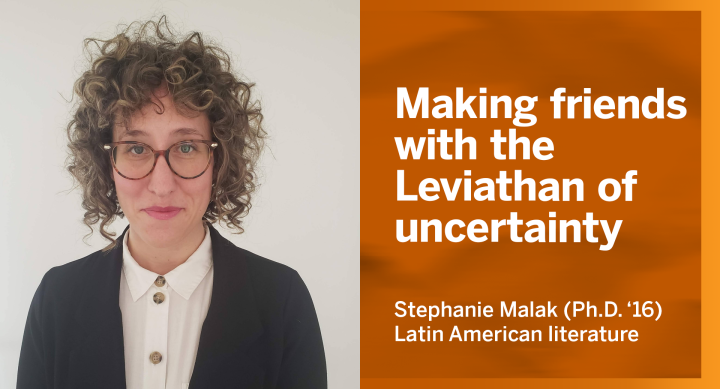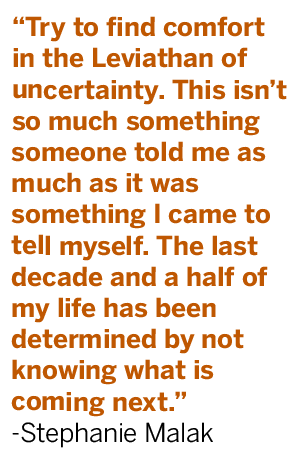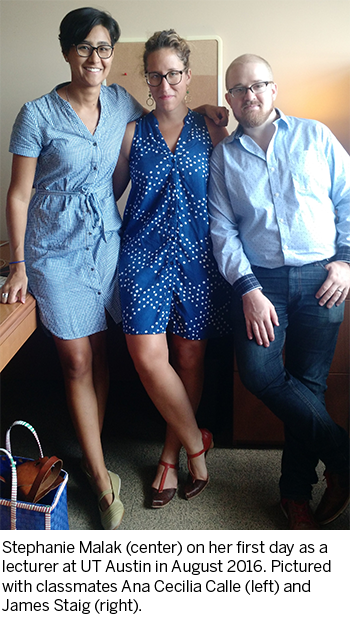
A self-proclaimed ‘defector’ of academia, Stephanie Malak (Ph.D. '16) has spent the last six years learning to be comfortable in the face of uncertainty. After completing her Ph.D. in Latin American literature, she currently works as a senior research associate at Spark Admissions, a college admissions consulting firm. Upon graduation, Stephanie found the courage to venture into uncharted territory when a fateful fellowship helped open her mind to career possibilities beyond a professorship.

What inspired you to pursue a Ph.D.?
I have always loved Latin American literature and the study of languages. It was something I had thought about studying in an advanced way as a high schooler, but I certainly didn’t have a Ph.D. in mind. I never had these abstract dreams of being some sort of public intellectual. It just started as a very classic romanticizing of literature that led me to pursue a Ph.D.
Did you always know that you wanted to work outside of the field of academia as a doctoral candidate?
I was excited about being on track for professorship when I graduated from UT. Things are very different in my department now, but at the time there was no discussion of leaving academia. No alternative options were presented when I didn’t have a job offer at graduation, despite my best efforts to secure one. In fairness, I was very hot on the job market for two years—both the 2015-2016 and 2016-2017 cycles—while I finished my dissertation and then subsequently worked as a lecturer in Spanish and Portuguese. I had started to take on some more editorial type roles throughout those two years and found myself as an associate editor at a great magazine run by Randy Lewis in the American Studies department. I thoroughly enjoyed that job. I loved working with writers, artists and activists of different kinds to help them shape their projects. But even then, I didn’t have some sort of eye toward the idea of publishing or editorial roles because the work was just happened to be something I enjoyed.
It was early 2017 when I applied for a publishing fellow position at the University of Texas Press. I remember I was sitting on a park bench in Lima, Peru between sessions at the Latin American Studies Association Conference, scamming the Wi-Fi off the person next to me, when I got the fellowship offer. I read that email and just melted. I instantly knew that I was going to take the offer; it was the most immediate decision I ever made in my life.
Funnily enough, I hadn’t known how tied I was to the fellowship leading up to that moment. I was not yet wedded to leaving academia, but that fellowship ended up changing my trajectory in many ways. Looking back now, I realize that I was pursuing all kinds of projects in the years prior to that moment that were pushing me in a new direction, but I wasn’t totally cognizant of that at the time. I started to let go of that professorship dream and was pleasantly surprised to find that it didn’t leave a gaping hole in my life.
What led you to change your mind and pivot to publishing?
There wasn’t one watershed moment where I realized I no longer wanted to be a professor. That fellowship at UT Press was very decisive for me but I think it also just grew easier for me to see myself developing and exploring those skills in other ways as time went on. I didn’t wake up one day and say, “Publishing is the route for me.” I had to slowly learn how to let go of the “academic” version of myself I held in my mind. Because I liked all the parts that make up the whole with professorship—the teaching, the idea of service, and the reading and writing components—I figured I was meant for the job. Letting go of those skills in that one form helped me to realize I could still pursue them in another.

Do you have a favorite memory from your time at graduate school?
When I was a couple of weeks out from my qualifying exams at UT, I ran into a faculty member who asked me if I felt ready to sit for the upcoming tests. Obviously I was not going to tell her no so I said, “‘I hope the best version of myself shows up that day.” It wasn’t a premeditated thought; I felt cornered to say something and it came out sort of subconsciously. In retrospect, the test day could have been a bad day. Let’s say I didn’t know the information or I couldn’t produce what I should have. Sometimes you just don’t have good days—that’s true for all of us. All I could do was, and still is, hope that the best me shows up each day.
How does your Ph.D. serve you in your current position?
At my job as a senior research associate at a higher education consultancy, I do a lot of research, writing and editing, so that’s a pretty obvious A to B with my degree. An overwhelming majority of individuals in my workplace also have Ph.D.s in humanities. Sharing the space with like-minded folks who got here in a similar way creates a familiar environment as we share a common vocabulary.
I have always been multifarious in my approach to life, so I like to do perhaps too many things at once. Since I can never seem to rein it in, I also currently work as a developmental editor at this unbelievably amazing editorial consultancy called Ideas on Fire. At Ideas, we work with progressive, intersectional academics who are shaping projects for scholarly publication. I absolutely adore the community we work with; we collaborate with a lot of women and women of color. Some of us editors are academics, some are academic-adjacent and some are not into academia at all. Also, more recently, I became the new translations editor at The Common, a literary organization whose mission is to deepen our individual and collective sense of place. Both roles have been so much fun, and I appreciate the diversity of experience that goes into the readers and writers we serve and how these jobs allow me to continue my relationship with literature and academia. I get to exercise that scholarship muscle that is still embedded within me, but I don’t have to do so in a silo.
Do you have any words of wisdom to share with current or prospective graduate students?
Try to find comfort in the Leviathan of uncertainty. This isn’t so much something someone told me as much as it was something I came to tell myself. The last decade and a half of my life has been determined by not knowing what is coming next. I just recently reached a point of stability in my career after many years of uncertainty. The only reason I was able to cope with this uncertainty and subsequent anxiety is due to graduate school; I was trained, intentionally or not, to withstand it. The two positions I currently hold both just started in the past eight months. I graduated in 2016 and I’ve only now reached consistency in my career - six years later.
Learning to find comfort in the unknown has been very important in getting me to where I am today. I feel confident in the fact that my situation as it stands now will also change. This perspective allowed me to enjoy, rather than merely tolerate, the past six years. Persistence, patience and learning to lean into the unknown have been key themes in my life for a long time. You caught me at a good moment. I have no clue what things will look like in five years but for now, this is where I’m at.